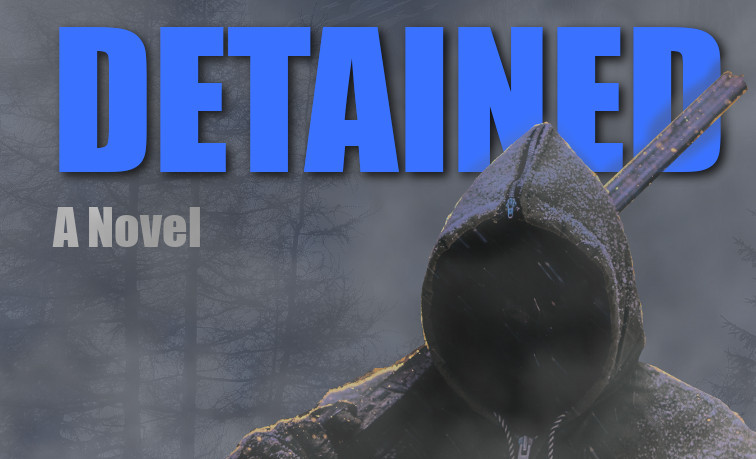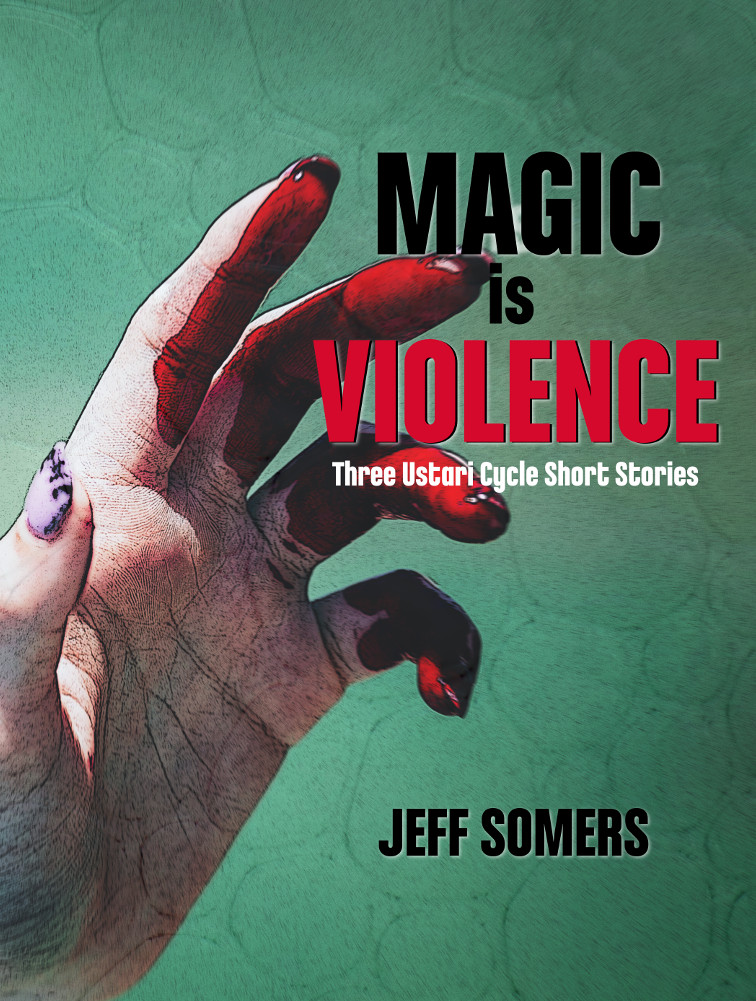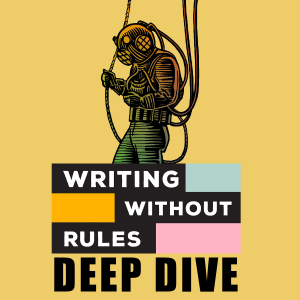Detained Chapter 24

I’ll be posting one chapter of my novel Detained every week throughout 2021. Download links below.
24. Candace
She heard her father exclaiming, How about that! He used to do it as an impression of an old baseball announcer, and it was one of his stock responses to things that amazed him or confused him. If he didn’t understand what had just happened, he bought time by doing his impression.
Well, she thought, a strange feeling of mental paralysis seizing her, how about that?
She didn’t know what to do. She was literally frozen, and for a moment she didn’t think her muscles would obey her even if she tried to move. Every thought trailed off into static. A man had been sitting in a chair, and then he was gone, and she felt the world tilt around her, as if the very foundation of reality had crumbled, turned soft.
“No one move!”
Candace blinked and then then slowly turned to look at Myra. Move? She couldn’t even think. She looked at Mike, but he was just staring into space, the gun held limply by his side.
Myra threw herself into the chair and began working the mouse. “Jesus fucking Christ, Em, what the fuck did you do? There’s no way the array plotted out all possible outcomes in that time frame.”
On the big screen, the cursor moved through the code restlessly. Mike licked his lips and blinked.
“What did he do?”
Myra glanced up, then at the screen again. “You’re both experiencing something we jokingly refer to as Reality Lag. You’re in a precarious quantum state as you have direct experience with a state of reality that is no longer true. You remember something that never happened. It will pass. You’ll be a little loopy for a bit, but you’ll feel better. You might retain the memories.” She sucked in breath and blew a strand of red hair out of her face. “To answer your question, for reasons known only to himself, Dr. Raslowski apparently chose to change an aspect of his reality and it either had exactly the effect he desired, or it had completely not the effect he desired.”
“I thought,” Candace said, struggling with her thoughts, which kept skipping back to the sight of Raslowski vanishing. “I thought you said it only worked in this room? Where could he have gone?”
Myra nodded. “You can only affect things in the field, yes, but everything is connected. The reality in this room is part of the reality outside this room. That’s what the cloud is for—to trace all the possible consequences of a change. You change something in here, and it reverberates. It ripples. And if you’re not careful, those ripples can carry you off.”
Candace shook her head, trying to clear it. It was like a bell had been rung somewhere and it didn’t make any noise but she couldn’t stop listening for it, all of her thoughts fraying.
“The past,” Mike said. “You’re saying that when you change one of the equations, a variable in those equations, you can change the past.”
Myra nodded, eyes glued to the screen. “Time doesn’t flow. It doesn’t move. It’s a continuum. It’s a web of interconnected variables related via mathematical rules. Change a variable in this moment, like I said, it reverberates. It ripples back and forth, spreading out, resetting. If you’re not careful, you can do incredible damage. That’s why we have the array: To make certain a tweak doesn’t turn into disaster.” She glanced at him. “And that’s why we couldn’t just tweak y’all out of trouble. The ramifications were too huge, not even the array could calculate everything. We had no choice but physical, real-time intervention because if we altered a variable connected with you to ensure you went down a different path, we couldn’t be sure we weren’t going to blow the whole thing up.”
Candace shuddered, and felt something … click back on inside her. Like a final connection that brought a power grid back online. Her mind cleared. “When you say the whole thing you’re talking about … reality. The universe.”
Myra nodded, eyes back on the screen. “The whole damn enchilada. I kind of suspect that Emory—Dr. Raslowski—came pretty close to doing just that a moment ago—there it is.” She took her hands from the keyboard and leaned back. “He tried to alter things so he’d never been injured. Whatever happened to his shoulder, he tried to erase it.”
“And what happened?” Mike asked. Candace could tell he’d just experienced what she had—a sudden clarification in his thoughts.
“Well, we’re still here,” Myra said, raising her eyebrows. Candace thought she was entirely too cheerful for the situation they were in. Her day had gone from bad to … weird. People were still dead, and now she knew she’d been a rat in an experiment for months, being watched and observed. All because this ludicrous set of computers had told an old scientist and his entirely too hot assistant that she was one of four people who would somehow engineer the end of the world.
I could have saved y’all some time, she thought, and told you that waitressing at One-Eyed Jack’s is soul-crushing, but not that soul-crushing.
That made her think of Jack McCoy, and she felt tears welling up. Jack hadn’t hurt anyone, ever. He’d never made a pass at her, or gotten mad when the count at the end of the day was off and took an extra hour to figure out, or when she’d shown up hungover and grouchy. He’d been kind, and patient, and if he wasn’t the most evolved man in the world there’d been an essential goodness to him she’d loved, and now he was dead. And in a strange way, she was responsible for that.
“Can you … tweak it back?” Mike asked. “Reset it to where we were before?”
Myra shook her head. “First of all, we don’t know what the ripples are. Sure, we seem to be fine. But that’s the thing, that Reality Lag I mentioned—it fades, and after a while you’re not even aware anything’s changed. You slot into the new reality, and it just becomes reality, the way things have always been. So we’re still here, but we can’t be sure what might have been altered. It might be limited to Emory; he’s a genius and no one understands the math better than he does. But it might not. It might have changed everything and not in a good way. And if I tweak it back but not perfectly, I might make things infinitely worse.” She sighed. “In other words, the fact that we’re here having this conversation means we maybe dodged a bullet. Emory might be out there all healed up and fine, and we’re still breathing. I try to change things back and miss a crucial detail, poof! we’re all dead. Or the world ends. Or, I don’t know, the supeintelligent roaches rise up and take over.”
Candace blinked three times hurriedly. “What?”
Myra waved a hand. “Sorry, a private joke among reality distortionists.”
“Well,” Mike said. “Step one, I guess, is to locate the good doctor. If he’s okay, then maybe everything else is, right?”
Myra nodded. “It would be a good sign.”
“So where do we look?”
Candace sighed. “We start at the obvious spot: Where I shot him.”
Myra nodded. “That makes sense. I’ll—”
Mike shook his head. “You’ll have to come with us.”
Myra blinked and cocked her head, making her look, Candace thought, kind of bird-like. “What?”
Candace looked at Mike. “He’s right. You just showed us you can … well, change things, right? So we can’t just leave you here to tap on that keyboard and then, suddenly, we’re dead, or just disappear, or never existed or something.”
Myra frowned. “That’s not exactly how this—”
Mike nodded, bringing the gun up. “I’m sorry, but you’re coming with us.”
The drive back to the bar was silent. Candace felt strange behind the wheel, even stranger knowing Mike was in the back seat holding a gun, and, for some reason, strangest about having Myra in the passenger seat next to her. The woman was intimidating. She was tall and gorgeous and smart and wore the hell out of her cats-eye glasses, and oozed a confidence that Candace had never possessed.
Seriously, you’re jealous? She thought to herself. With everything that’s happened, you’re hate-crushing on Myra?
It was ridiculous … but there it was. She kept stealing glances at her in the darkness, wondering how you learned to just sit so still, to move so easily.
At the entrance to One Eyed Jack’s, she slowed the beaten-up rental and let the headlights play over the parking lot.
“It was close to the tree line,” she said. “He was … the memory’s a little fuzzy—”
“It’s fading,” Myra said. “If you concentrate you can hang onto it, but it will seem like a dream you had once.”
Candace nodded. “By the tree line. He was just taking a straight line from the bar, making a run for it.”
“All right,” Mike said. “Candace, get out and walk around to the passenger side and open Myra’s door. Then we’ll both get out and follow you to the spot. Myra, there’s a small flashlight in the glove compartment.”
“Very glad to have met you,” Myra said, leaning forward and opening the compartment. “You’re just as sociopathic as I imagined.”
Candace took the flashlight and led them into the darkness. Myra followed, her arms wrapped around herself, and Mike trailed behind. He resisted the urge to glance at the bar, although he felt exposed walking right in front of it. He wasn’t sure if anyone peering out would be able to see them, but he hoped they could get through this investigation without being noticed.
They found Raslowski in the gravel.
“Jesus,” Myra said as they stood there, the flashlight trained on him.
He’d been shot in the back, and the bolt had hit him with such force that he’d been knocked forward, leaving a trail in the stones that had cut up his face and arms. He was face-down and had been dead for a while.
“Did I—” Candace said, her voice cracking. “I mean … I did. I can remember it. I didn’t mean to, I meant to warn him or maybe just graze him. But he turned suddenly, and I shot him through the … oh, fuck.”
“You didn’t do this,” Myra said as Mike put a hand on her shoulder and squeezed. Without thinking, she reached up and put her own hand over his. “Well, I mean, you did, but Emory survived, originally. When he tried to undo the injury—I guess so he’d have his strength back, be able to go against you—he moved too fast. Didn’t check all the possibilities, didn’t let the array do its job. One of his variables went wrong, and this is what he got.” She looked at Candace. “What you did was injure him. And then he changed it. Eventually you’ll only remember it the one way, but remind yourself, if you can.”
Candace nodded. She was touched. This woman she almost instinctively didn’t like, who was an enemy as far as she was concerned, had just gone out of her way to make her feel better. It made her strangely hopeful for the next few hours.
“Myra,” Mike said quietly. “If I believe what’s been said tonight, you all have been thinking of us as terrible people for a long time. I don’t understand anything. I used to think I did, but nothing that’s happened tonight makes any goddamn sense to me. But I saw a man tap on a keyboard and change reality. So I guess we take this shit seriously from now on.”
Candace thought he sounded sad. Defeated.
“So, I’m sorry, but you’re going to have to stick with us, Myra. We can’t let you go unsupervised until we have a better grasp on things. You said the original plan was for us to stay put, right?”
Myra nodded, her eyes locked on Raslowski.
“Did that mean in the bar? Or do we just need to not interact with any … outside forces?”
Myra took a moment, and when she answered she sounded distracted, dreamy, and kept her eyes on Raslowski. Candace wondered how long they’d worked together. “The model stipulated in the bar, but I don’t know for certain what the variables read. There may have been a presumption that the easiest thing to do was keep you in the bar, even though the real requirement was non-interaction.”
Mike nodded. “We’ll have to chance it,” he said, turning to look at Candace. “If we stay here, they might come check on us. Send more soldiers. We don’t know what kind of failsafes or procedures they have in place. Based on this,” he turned and gestured at Raslowski, “I’m willing to believe … well, that something is happening. Or will happen. Something I don’t think I understand. So my vote is this: We do as Raslowski wanted, we stay out of sight for the next twelve hours or so. But not here. Do you know of any place nearby we could set up camp—someplace they might not know about? Someplace off-grid?”
Candace thought, feeling his hand on her shoulder. She found herself agreeing with him. The evening had been one head spin after another, and the safest thing to do was probably to find someplace to lay low, wait out the storm.
“Okay,” she said quietly. “Yes. There’s a cabin. We all call it The Sprawl—it’s a long story, the place has history. Not sure who owns it, if anyone does. In country, totally cut off. I go there sometimes to be alone. It’s always been a place for local kids to go and party, but it should work this time of year. We’ll have to drive.”
She was impressed at how steady her voice was.
“My car’s low on gas,” Mike said, and gently pulled his hand free. She liked him. There was no pretending otherwise: No matter how crazy things had been, she was oddly glad that everything had gone off the rails when Mike Malloy had shown up, instead of the week before, or the next day after he’d gone.
“We can take my Trailblazer,” she said, thinking she sounded surprisingly calm. “The doors don’t lock and there’s always a key in the glovebox.” He looked at her and she smiled. “What?” she said. “Look where I live. No one’s gonna steal a twelve-year old Trailblazer.”
There was a smoky smell in the air. She watched him nod and hold out one hand towards her, and she considered how calm she felt. Her life had just blown up. She’d experienced more violence in the last few hours than in her entire prior life, and she suspected more was to come. But she felt fine.
She took his hand and for a moment they just stood there, basking, she thought, in a split second of being at peace.
“Come on, Myra,” Mike finally said, turning away and gesturing with the gun. “Let’s go get everyone else. I’m sorry but we’re going to tie you up for a while. No offense.”
Myra snorted. “Oh, none taken. Like I said: Sociopaths.”
They walked towards the bar, gravel crunching under their feet. The night was suddenly quiet and still, just the soft glow of lights in the bar, and the smell of fire in the air, and doom and the end of all things around them like a heavy gas.
“Hold it.”
They froze. Candace turned and squinted at the dark form standing a few feet from them. He was a large, round-shouldered man, holding what was unmistakably an assault rifle.
“Glen?” she said, staring.
“Shut up,” Glen Eastman growled. “Hands up. No one’s going anywhere.”






